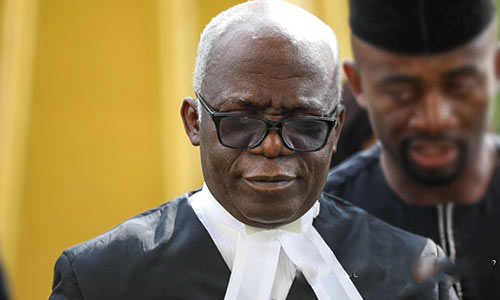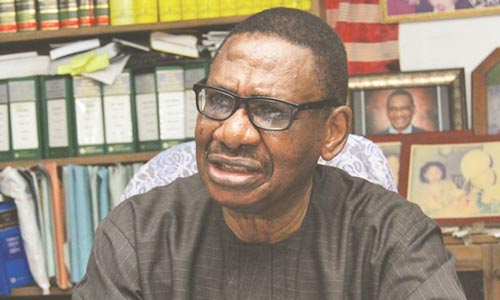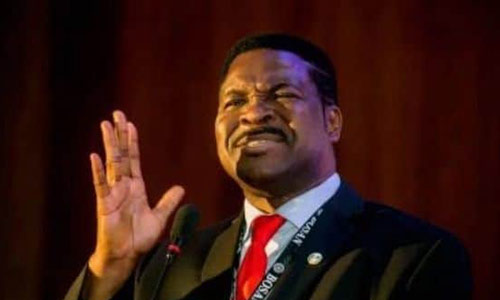Falana, Others Berate Buhari For Warning Against Court Summons After Tenure

As reactions continue to trail comments and issues arising from the President’s recent interview with Channels Television on Wednesday, lawyers and civil society have raised eyebrows in reaction to the President’s comment warning against any personal court summon after his administration.
During the interview, when asked about the 2023 election, he responded; “said, “It’s not my problem.”
Asked further if he had no interest in who succeeds him, he said, “No, let him come whoever it is. All important things I made sure are on record.
“Nobody should ask me to come and give any evidence in any court, otherwise, whoever it is would be in trouble because all important things are on record. I made sure about that. Important issues are all on record.”
The response of the President has since generated reaction from legal practitioners in light of the immunity enjoyed by the President which constitutionally expires on at the end of his tenure.
In his reaction, human rights lawyer and Senior Advocate of Nigeria, Femi Falana stated that he believes Buhari was misquoted in that section of the interview, noting further that the orders that could not be enforced against him at the moment because of his immunity would be enforced when he leaves office next year. He resounded that the President would be held accountable both domestically and internationally.
Making reference to a recent report by The Guardian titled, ‘BPP kicks against award of ICTN contract to medical firm’, Falana said while still in office enjoying immunity from prosecution Buhari was already being indicted by a Federal Government agency.
Falana also made reference to several court judgments secured by an anti-corruption group, Socio-Economic Rights and Accountability Project, against the Buhari regime.
He said, “Right now, he (Buhari) is already being called upon to give account not to talk of after he leaves office. These orders are going to be enforced.
“More accountability cases are likely to be filed between now and 2023 and thereafter. In view of the avalanche of petitions alleging extrajudicial killings by security forces, the Special Prosecutor of the International Criminal Court is likely to open investigations that may implicate top officials of the Federal Government.
While he is still in power, even the BPP is indicting him. People have gone to court to say, ‘You and (Rotimi) Amaechi can’t award this contract.’ Now he enjoys immunity; when he is out of office, he won’t enjoy any immunity. So, he should be expecting to be called upon to give account. And if the records are there, he will have to come forward to present the records. Those records are not in the public domain.
“Many of the times you request for information under FOI (Freedom of Information Act), they won’t reply. So, how can he say the records are there?”
Falana added that if nobody was in trouble “even now that he (Buhari) is in office enjoying immunity and has all the forces, instruments of oppression and intimidation and people are suing him, demanding accountability, when he is no longer in power, his immunity would have expired, so he could be called to account (for his actions) locally and internationally.”
Another human rights lawyer and Senior Advocate of Nigeria, Ebun Olu-Adegboruwa has also expressed discontent with the President’s comment describing it as an attempt to blackmaik this successor in office even though his immunity according to Section 308 of the Constitution ends upon the expiration of his tenure.
He said,” What the President has said is purely emotional blackmail and is using style to threaten his successor, which is unexpected of a President that claims to be fighting corruption. The person fighting corruption cannot himself be running away from investigation or probe because that would be inconsistent with the President’s open declaration to be ahead in anti-corruption fight.
“The immunity granted to him is limited while in office, and once he concludes his tenure he can be arrested, like every other citizen. There is no law that protects an ex-public officer from being summoned by the court to give evidence or account of their tenure.
Under section 6 of our constitution, the courts are given the right and power to exercise jurisdiction over any citizen, and once the President completes his tenure in 2023, he should be expecting that a lot of times, he would be summoned to account for his tenure; the railway project, Chinese loans, humongous amount spent on electricity and we are only getting darkness and a lot of things the President has to account for, so he should be ready. As a matter of fact, he should be ready.”
Adegboruwa noted that in the countries Nigeria copied its democracy from, some presidents had had to waive their immunity to be probed. “I think if the President has nothing to hide, he should be the first person to attend court if there is any matter that seeks to interrogate his tenure in office.”
Also, Adedipe said Buhari could be compelled to appear before a law court after leaving office.
He added, “I don’t want to agree that he does not want to be held accountable, of course he can be compelled to appear in court after his tenure ends. He can be summoned, the law of evidence permits that, and the constitution does not extend the immunity to after office.”
Further commenting on the issue, the Chairman of the NBA Human Rights Committee, Mike Ozekhome SAN described the President’s statement as a display of impunity and disregard for the rule of law.
“President Muhammadu Buhari loses his immunity enshrined in section 308 of the 1999 Constitution by May 29, 2023. He becomes an ordinary citizen liable to be subpoenaed to ‘answer any questions’ from any court of law. He can never run away from it. He said all important things are on record. It’s all well and good. But where clarifications or evidence are required, he is subject to being invited like any other citizen to come with answers.
“Indeed, he is more obligated than other citizens because he is the President and Commander-in-Chief of the Armed Forces of the Federal Republic of Nigeria. This kind of statement shows a mindset of disdain for the rule of law and due process. It is not acceptable at all. I humbly condemn it.”
Meanwhile, 83-year-old senior advocate of Nigeria, Robert Clarke, said the President had the impetus to say such because no former Nigerian President had been questioned after leaving office.
He said, “It is a tricky situation. Normally if a President resigns or leaves office and does many things wrong, the succeeding government can call him to come and account for what he did while in office but because it has not happened maybe that is why the President is feeling that way.



